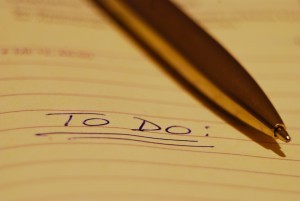 If your business has slowed down during the long summer months, it may be tempting to mentally “check out” while you’re in the office.
If your business has slowed down during the long summer months, it may be tempting to mentally “check out” while you’re in the office.
But there are plenty of ways to remain productive, and check off some significant items on your annual “to-do list.”
Les McKeown, a contributor to Inc., outlines numerous suggestions to get more out of the summer months. Here are a few of his best tips:
Where is it written in stone that your annual review—reflecting on what you’ve learned, achieved, missed out on, etc.—has to take place at the end of the year? Remember, those end-of-the-year reviews coincide with the Christmas holidays, which only adds to the stress of the exercise.
If you reschedule the annual review in the summer, “you get to do it in a much less frenzied state,” McKeown says, “and with much more likelihood that you will actually implement the lessons you learn.”
If you enjoy reading but can never find the time, the dog-days of summer are a perfect opportunity to open a book (or double-click on an ebook file). There’s a bounty of idea-generating business books out there, plus plenty of online recommendations to steer your intellectual pursuits.
“Read consciously, deliberately, and read to learn,” McKeown says.
Which of your projects have you seen through to fruition, and which ones are currently on life-support? McKeown urges business owners to make a brain dump of every project they’re involved in, and reprioritize according to principles he’s outlined elsewhere.
There’s probably no better time than now to conquer email overload, and free yourself of this particular mental burden.
All business leaders who achieve greatness are driven to achieve one “pre-eminent goal,” McKeown says—the “clear, unambiguous deliverable [that] dictates and prioritizes their activities” every day of the week.
Use this time to re-examine your most important goal, and take steps to bring yourself closer to its ultimate completion.
Most of the time, we’re far too busy to look objectively at our work environment, even if it’s cluttered, riddled with distractions, and non-conducive to creative thought. What better time than now to clean it up?
It’s a safe bet you’ve accumulated a lot of stuff you can toss out. Be ruthless in your quest to improve your work environment and make way for greater productivity.
There are many ways to give something back to your community. McKeown suggests leaders offer “what is most valuable to you: Your time.” Volunteer with a charitable organization. Mentor a promising young entrepreneur. Coach a Little League team. “I guarantee that you—and therefore your business—will be the better for it.”
If the summer months offer you a chance to catch your breath, seize the opportunity to improve yourself and your business. Come September, you’ll be ready to hit the ground running.
How are you being productive this summer?
 The second most popular New Year’s resolution is to get organized, according to a recent study published in the Journal of Clinical Psychology.
The second most popular New Year’s resolution is to get organized, according to a recent study published in the Journal of Clinical Psychology.
To get started, many people create to-do lists. However some experts say these lists are counterproductive.
Stephanie Vozza wrote an article for Entrepreneur on how leaders should forget their to-do list.
In it she references productivity expert Laura Stack. Stack says, “Combining everything is very distracting and makes it difficult to determine what to work on next. You must separate what you need to do today with what you don't need to do today."
To best organize your time, Stack suggests leaders compile these three lists.
HIT stands for high impact tasks. These are limited, daily to-do lists which guide your day. They are important, short-term tasks that need to be completed. Stack says if your HIT list contains more than 10 items, “You’re stretching it.”
If there is a task that continuously gets pushed to the next day, you should move it further into the future as it’s not a priority.
This list keeps track of everything you need or want to do at some point. Some people use this as their daily to-do list. Stack suggests you add important tasks that lack urgency or don’t have a deadline to the master list. Review it weekly so you don’t forget about it, and add start dates based on importance suggests Stack.
This list consists of tasks you need to avoid because they are a waste of time. The key to productivity is not to get more done each day, but to get important work done. “You don’t need a calendar full of unnecessary tasks to be productive and accomplish more,” Stack says.
Jessica Stillman of Inc. wrote on the same topic but took a different view. She says nearly everyone has a to-do list, but close to no one actually uses them as intended. If you don’t want to create multiple lists as Stack suggests, Stillman says the key is to use a to-do list as a way to map out your work rather than a mnemonic aid.
“Use your to-do list to make a plan--specifically think through when and where you'll do the tasks and in what order--and you'll find you maximize the actual benefit you get out of the exercise, a quieter mind rather than a series of boxes you'll actually tick,” she adds.
It’s easy to let a day or week go by without checking off a task on our to-do lists. A to-do list doesn't make you organized or more productive. It may even be a waste of your time to create one. Whether you create one list or three, create a list that works for you. Think about what fits your personal style.
Are you guilty of creating to-do lists and then completely ignoring them?
Image courtesy of Stock.xchng
